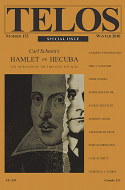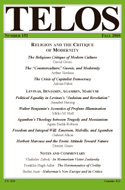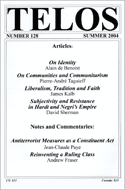By Telos Press · Thursday, December 23, 2010 Season’s Greetings from all of us at Telos Press!

Continue reading →
 If recent discussions of Schmitt in these pages have made a broad case for the centrality of culture for his thinking, the current issue both specifies and generalizes this approach. The specificity derives from our focus on one key text by Schmitt that is often passed over but is in fact crucial for understanding his work. The generality is a result of the breathtaking sweep of issues that this text opens up for the contributors to this issue: the relation of sovereignty to popular will, the ontological status of modernity, the role of myth in society, the representational structure of human existence, the relation of art and theology to the public sphere. These discussions take our understanding of Schmitt into new directions that draw out not just the aesthetic and cultural aspects of his thought, but also reveal the import of his methods for fundamental questions of epistemology and ontology. He arrives at such questions through the consideration of a single exemplary case: Shakespeare’s Hamlet. If recent discussions of Schmitt in these pages have made a broad case for the centrality of culture for his thinking, the current issue both specifies and generalizes this approach. The specificity derives from our focus on one key text by Schmitt that is often passed over but is in fact crucial for understanding his work. The generality is a result of the breathtaking sweep of issues that this text opens up for the contributors to this issue: the relation of sovereignty to popular will, the ontological status of modernity, the role of myth in society, the representational structure of human existence, the relation of art and theology to the public sphere. These discussions take our understanding of Schmitt into new directions that draw out not just the aesthetic and cultural aspects of his thought, but also reveal the import of his methods for fundamental questions of epistemology and ontology. He arrives at such questions through the consideration of a single exemplary case: Shakespeare’s Hamlet.
Continue reading →
By Michael Marder · Wednesday, December 8, 2010 For the past twenty years, a sizeable segment of analytic philosophy has been openly promoting naturalization, a process that has implicitly defined the goals of this philosophical strand since its very inception. The object of naturalization is so diffuse as to include epistemology and phenomenology, jurisprudence and education, power and responsibility, and, indeed, any human phenomenon whatsoever. The sheer extent of this devastating trend makes it a good candidate for close critical scrutiny, which can help us diagnose the condition of analytic thought, structurally incapable of a sober self-assessment, and to explain its pernicious political consequences.
Continue reading →
By Telos Press · Saturday, December 4, 2010 From Telos 152 (Fall 2010), Dimitri Ginev’s “The Erotic Attitude Toward Nature and Cognitive Existentialism.” Read the full version at TELOS Online website.
 The article considers the relevance of Herbert Marcuse’s project for a “new science” to the contemporary studies in hermeneutics of science. This project involves new criteria of epistemological rationality, non-traditional views of nature, and new empirical data models for verifying science’s hypothesis. In scrutinizing the idea of an “erotic attitude toward nature,” the article suggests an approach to revealing the interpretative fore-structure and the hermeneutic situation of the “dialogue with nature.” According to the principal argument, the chance for such a dialogue lies in science’s hermeneutic and self-critical potential. The only way of putting the dialogue with nature into effect is by actualizing alternative possibilities projected by readable technologies of scientific research. The essay makes the case for the claim that since the dialogue is necessarily involved in the reading that constitutes meaning within domains of research, then there is a non-eliminable political dimension that will be associated with the search for an “authentic normality” of nature’s entities. It suggests a broadening the scope of the critique of scientism, in opposing at the same the constructivist rejection of a “politics of nature.” The article considers the relevance of Herbert Marcuse’s project for a “new science” to the contemporary studies in hermeneutics of science. This project involves new criteria of epistemological rationality, non-traditional views of nature, and new empirical data models for verifying science’s hypothesis. In scrutinizing the idea of an “erotic attitude toward nature,” the article suggests an approach to revealing the interpretative fore-structure and the hermeneutic situation of the “dialogue with nature.” According to the principal argument, the chance for such a dialogue lies in science’s hermeneutic and self-critical potential. The only way of putting the dialogue with nature into effect is by actualizing alternative possibilities projected by readable technologies of scientific research. The essay makes the case for the claim that since the dialogue is necessarily involved in the reading that constitutes meaning within domains of research, then there is a non-eliminable political dimension that will be associated with the search for an “authentic normality” of nature’s entities. It suggests a broadening the scope of the critique of scientism, in opposing at the same the constructivist rejection of a “politics of nature.”
Continue reading →
By Telos Press · Wednesday, December 1, 2010 From Telos 152 (Fall 2010), Gabriel Alkon’s “Freedom and Integral Will: The Abandonment of Sovereign Power in Emerson, Melville, and Agamben.” Read the full version at TELOS Online website.
 According to Giorgio Agamben, the Aristotelian conception of the act presupposes a sovereign decision on the passage to actuality. Only an utterly abandoned potentiality, says Agamben, would escape the logic of sovereignty. One of his figures for this pure-because-abandoned potentiality is Bartleby the Scrivener in Herman Melville’s story. Against Agamben this article argues that the notion of pure potentiality remains within the logic of sovereignty, which depends on the separation of actuality and potentiality. This separation establishes the sovereign will by placing it between potentiality and actuality and apart from both. By reducing it to preference and absolving it from action, Bartleby protects his sovereign will and reveals its essential emptiness. According to Giorgio Agamben, the Aristotelian conception of the act presupposes a sovereign decision on the passage to actuality. Only an utterly abandoned potentiality, says Agamben, would escape the logic of sovereignty. One of his figures for this pure-because-abandoned potentiality is Bartleby the Scrivener in Herman Melville’s story. Against Agamben this article argues that the notion of pure potentiality remains within the logic of sovereignty, which depends on the separation of actuality and potentiality. This separation establishes the sovereign will by placing it between potentiality and actuality and apart from both. By reducing it to preference and absolving it from action, Bartleby protects his sovereign will and reveals its essential emptiness.
Continue reading →
By Maxwell Woods · Tuesday, November 23, 2010 On Tuesdays at the TELOSscope blog, we highlight a past Telos article whose critical insights continue to illuminate our thinking and challenge our assumptions. Today, Maxwell Woods looks at Alain de Benoist’s “On Identity,” from Telos 128 (Summer 2004).
 The demand for identity and the difficulty of answering the seemingly innocuous question “Who am I?” persists throughout the world in the material form of nationalism. The French government targets the Roma as an ethnic group for expulsion, the minister-president of Bavaria proclaims that foreign workers from other cultures are not needed, and recent Arizona legislation demands that all aliens in the state must carry registration documentation at all times—all, in their simplified forms, are broad statements of identity: I am French, Bavarian, American, etc. This renewed nationalist identity, which many assumed had died in the post-Nazi and postcolonial epoch, contradicts the prevailing multicultural ideology that has dominated Europe. Yet this reemergence of collective identities could be previewed in the very process of identity’s reconceptualization in modernity’s individualist ideology. Alain de Benoist’s article “On Identity” defines identity in a historical dialectic, and contends that the seemingly antithetical positions of the modern individual liberated from his past and the essentialist notion that humanity’s fate is determined from the start are in fact two sides of the same coin. We must cast aside these positions and begin to understand identity as a dynamic process of becoming wherein we freely choose who we are while, simultaneously, who we choose to be is limited by our objective reality. The demand for identity and the difficulty of answering the seemingly innocuous question “Who am I?” persists throughout the world in the material form of nationalism. The French government targets the Roma as an ethnic group for expulsion, the minister-president of Bavaria proclaims that foreign workers from other cultures are not needed, and recent Arizona legislation demands that all aliens in the state must carry registration documentation at all times—all, in their simplified forms, are broad statements of identity: I am French, Bavarian, American, etc. This renewed nationalist identity, which many assumed had died in the post-Nazi and postcolonial epoch, contradicts the prevailing multicultural ideology that has dominated Europe. Yet this reemergence of collective identities could be previewed in the very process of identity’s reconceptualization in modernity’s individualist ideology. Alain de Benoist’s article “On Identity” defines identity in a historical dialectic, and contends that the seemingly antithetical positions of the modern individual liberated from his past and the essentialist notion that humanity’s fate is determined from the start are in fact two sides of the same coin. We must cast aside these positions and begin to understand identity as a dynamic process of becoming wherein we freely choose who we are while, simultaneously, who we choose to be is limited by our objective reality.
Continue reading →
|
|
